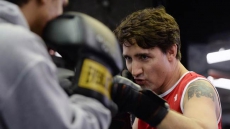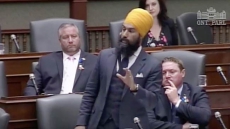TORONTO — Olivia Chessman has carefully laid out her attack plan for buying Tragically Hip concert tickets on Friday when the public sale begins.
The Kawartha Lakes, Ont., resident, like many other Canadians, will be sitting at her office computer and frantically clicking the reload button on her web browser in the hopes of scoring a few tickets to one of the few Hip shows this summer.
"I'm kind of expecting not to get any," she says. "It's the last run of shows and everyone and their mother seems to want tickets."
As a backup, she's recruited three other friends to try for tickets on their computers too.
They're joining a stampede of eager Canadians hoping to get seats to what's widely expected to be the Hip's final tour, given lead singer Gord Downie's battle with incurable brain cancer.
But Chessman is also up against several other factors that could keep her from getting tickets.
As a recent report by the office of New York state attorney general Eric Schneiderman declared: "ticketing, to put it bluntly, is a fixed game."
Over the past decade, the rise of computer software programs operated by scalpers have pitted man against machine in the fight for a limited number of concert tickets.
The software inundates the Ticketmaster website with requests that lock in seats by the second, while the average person struggles to keep pace with their computer mouse.
Not surprisingly, the machines almost always win.
The problem has frustrated music fans and captured the attention of government officials in the United States and the United Kingdom, who have launched investigations into the ticket resale market.
This week, Ontario's attorney general Madeleine Meilleur joined the chorus of criticism saying she wants to find out why so many Hip fans have been shut out while secondary sellers like StubHub have been flooded with tickets marked up by hundreds of dollars.
Dean Budnick, author of "Ticket Masters: The Rise of the Concert Industry and How the Public Got Scalped," has heard all the complaints before. He says disgruntled Hip fans have reason to be peeved, but he suspects most don't understand the complexities of today's concert ticket market.
Along with competing against scalpers with modern software, limited inventory is a problem.
Before they go on sale to the public, batches of tickets are often divided between fan club presales, credit card company customers and other buyers. Plus, artists and management secure some tickets for themselves too.
"That in and of itself takes its toll on available inventory," Budnick says.
Once the remaining tickets get filtered down to the public sale, it sometimes means there are only scraps to fight over, and many of them are scooped up by resellers who can capitalize on the limited supply.
Schneiderman's report, published in January, found that on average, about 46 per cent of event tickets are reserved for the public, while most of them are set aside for presales (38 per cent) or music industry insiders (16 per cent).
His office found that each year, at least tens of thousands of the publicly available tickets are being acquired by computer software run by resellers.

The report picked a U2 concert at Madison Square Garden on Dec. 8, 2014 to illustrate the challenge facing average concertgoers. Within a minute of the public sale, a single broker had purchased 1,012 tickets for the show, even though a supposed four-ticket limit was in effect for each customer.
The same broker acquired more than 15,000 seats to U2 shows across North America by the end of the day, the attorney general said.
Many of those tickets are resold at a significant mark up — with prices about 49 per cent higher on average and sometimes as much as 1,000 per cent above their original value, the report said.
The attorney general also raised concerns about the sales of "speculative tickets," or tickets not yet acquired by the broker which it expects to be able to purchase. Those drive overall prices higher on the secondary market.
The findings are enough to discourage some fans from pursuing tickets to big concerts all together, or turn to resellers and pay the inflated price.
That's what Chessman did last month when she lost the "impossible" battle for seats at Beyonce's Toronto show. She forked over $100 to StubHub for her ticket — more than double its face value — for the last row in the top section.
Chessman says it was worth the money, and she's ready to pay about $300 for the Hip if she loses out during the public sale.
"They've been my family's favourite band since I was a kid," she says. "There's a lot of sentimental value there."
And resellers are banking on it.





